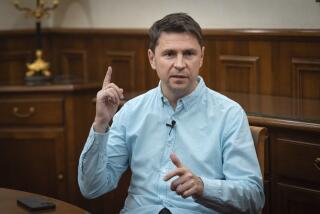Kremlin Waffles on Chechen Peace Pact
- Share via
MOSCOW — As Russian security chief Alexander I. Lebed took his peace campaign to a call-in television audience, the government voiced its first high-level reservations Monday about the breakthrough accord he reached with separatist rebels in Chechnya.
Prime Minister Viktor S. Chernomyrdin told Lebed in a private meeting that he was worried about two elements of Saturday’s accord, which builds on a recent cease-fire by deferring for five years the republic’s claim to independence from Moscow.
Russian troops have been fighting a losing battle in the tiny southern republic to crush and disarm the independence movement and to quell, by example, separatist stirrings elsewhere in the vast, ethnically diverse Russian Federation.
The accord negotiated by Lebed and Aslan Maskhadov, the separatist military chief of staff, aims to simplify the task of ending more than 20 months of fighting by setting aside the issue that started it.
But the plan has come under muted attack in Moscow as a sellout to the Muslim-led guerrillas--especially after the top separatist leader’s statement Sunday that it preserves what he called Chechnya’s de facto independence.
Chernomyrdin’s spokesman, Viktor Konnov, told the Interfax news agency that the prime minister is worried about “the political price of the deal” and its effect on Russia’s territorial integrity. President Boris N. Yeltsin’s chief of staff, Anatoly B. Chubais, echoed that concern, telling a news conference, “I am far from being euphoric that all the problems have been solved.”
Konnov said Chernomyrdin also told Lebed that the withdrawal of Russian troops from Chechnya--a step agreed to earlier and confirmed Saturday--should be accompanied by the disarmament of the Chechen population. Saturday’s accord said nothing about disarming the rebels, who control most of Chechnya.
The prime minister, who had said Sunday that Lebed’s accord was “on the right path,” has not spoken publicly about his reservations. But he apparently conveyed them to Yeltsin, who has yet to approve the deal, when the two met Monday.
In his evening appearance on Russian Public Television’s “Rush Hour” program, Lebed lamented Yeltsin’s silence on the accord and his refusal to meet with him. The general-turned-politician also gave his first spirited defense of the accord to a prime-time audience.
At one point, a viewer phoned in and asked, “Why hasn’t the president seen you yet?” Lebed replied: “I do not know. I have made yet another attempt today to talk to the president. The answer was that it will happen sometime later. Still, I do not lose hope.”
At another point, the program’s host read a Russian newspaper commentary suggesting that most of the Kremlin was scheming against the peace plan in an effort to block Lebed from succeeding the ailing Yeltsin as president.
“There is something to it, really,” Lebed said with a wry smile.
Breaking from the Kremlin code of shadowy intrigue, Lebed has made masterful use of the cameras to sell his month-old peace initiative to a war-weary Russian public. But Monday night was the first time he had taken calls from his audience.
A woman who managed to get through from Grozny asked if there was any hope for civilians fleeing that city, Chechnya’s all but destroyed capital.
“I remind you that I will pull out all armed units from both sides, and Grozny will be granted a status of a demilitarized city,” he answered.
Lebed was upbeat about other elements of the plan. He dismissed the likelihood of a Chechen civil war between separatists and Russian collaborators after Russian troops leave. He promised to put some collaborators on a joint commission that will oversee disarmament and postwar reconstruction. And he promised fair elections of a Chechen government under international supervision.
To critics of the deal, he said it differs “only slightly” and not substantially from the proposal Chernomyrdin authorized last week.
He insisted it would be unrealistic to predict that Chechnya, after five years of postwar cooperation with Russia on its rebuilding, would choose to go its own way.
“I would not fume so much about this possibility,” he said, adding that reconstruction “will mean the closest possible relations. . . . It is only a matter of a cool head. It is only the coolheaded who win. The hotheaded never do.”
More to Read
Sign up for Essential California
The most important California stories and recommendations in your inbox every morning.
You may occasionally receive promotional content from the Los Angeles Times.













